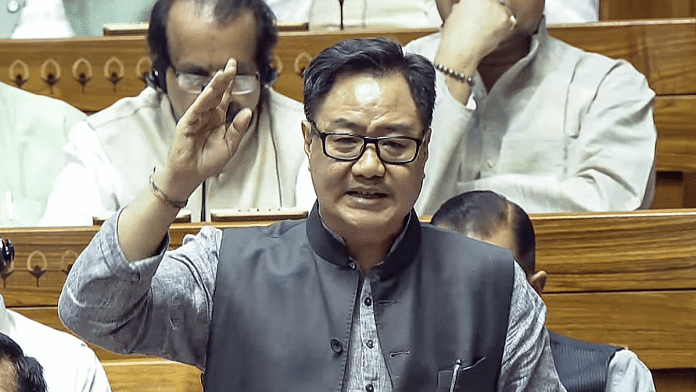
New Delhi: Accusing the Opposition of misleading the Muslims over the Waqf (Amendment) Bill, Union Minister Kiren Rijiju said that the United Progressive Alliance (UPA) government had denotified 123 properties in Delhi and handed them over to the Waqf Board. “If the Modi government didn’t bring this amendment, even Parliament could have been claimed as a waqf property,” the minority affairs minister said, while moving the controversial bill in the Lok Sabha on Wednesday. The government, according to him, has removed the most ‘draconian’ provision under which any property could be declared as its property by the Waqf Board “Under Section 40, the Waqf Board.
.. Previously any land could be declared as Waqf property, but we have removed the provision.

Now, no land can be declared as Waqf property for the benefit of the poor. Some individuals, I won’t take any names..
a few people were using it for their personal gain...
This provision was misused to such an extent that the number of properties increased to million,” Rijiju said in the Lok Sabha. The bill seeks to improve the administration of Waqf properties, introduce technology-driven management, address complexities and ensure transparency. He further said that the Christian community, the Catholic Church Council, Kerala were pressing for the passing of the amendment bill.
The Kerala Catholic Bishops Council (KCBC) and the Catholic Bishops Conference of India (CBCI) have urged the Kerala MPs to vote in favour of the Bill. “In Kerala, 600 Christian families are affected by the Munambam dispute as the land has been declared of the Waqf by the board. If this bill is passed then that land will be returned.
. that of poor..
farmers. In these things you must support this Bill. I believe that even now it is not too late,” he said.
“ ‘Rajnitikaran karke agar aap ade rahein aap mushkil mai phasne waale hai, vishesh karke Congress waalo ko mai kehna chahta hu. (If you persist in politicizing, you are going to be in trouble—I especially want to convey this to the Congress).’ I want to also tell the other parties that you should not get tricked by the claims of the Congress party.
” The Union Minister also gave a detailed breakdown of the Central Waqf Council’s membership structure and said the bill aims to make the Waqf Board more inclusive and secular. Rijiju claimed while there were no women in the Waqf Board as of now, Shia, Sunni, Bohra, backward Muslims, women as well as non-Muslim experts will all be represented in the Central Waqf Council. Citing his example to highlight the inclusivity factor, Rijiju said: “Everyone should welcome this move.
I will give my own example. Suppose I am not a Muslim, but I am the Minority Affairs Minister. Then I become the chairman of the Central Waqf Council.
Despite my position, in total there can be a maximum of four non-Muslim members in the Council, and among them, two women members are compulsory.” To allay “the fears created by the Opposition”, the Union minister said the provisions of the Waqf Board have nothing to do with the management of any mosque, temple, or religious site. “It is simply a matter of property management.
If a Muslim gives Zakat or Fitra, who are we to question it? It is a matter of religious sentiment, and the government has no involvement in it. However, Waqf properties are managed by the Waqf Board and the Mutawalli. If someone fails to understand this basic distinction or deliberately chooses not to, then I don’t have a solution for that,” he added.
Slamming the opposition, Rijiju said while India has the largest number of Waqf properties in the world, yet “no work has been done for the poor”. “The railway tracks, stations, and infrastructure belong to the nation, not just to Indian Railways. How can we equate railway property with Waqf property? Similarly, defense land, the second-largest landholder, is meant for national security and military training.
How can that be compared to Waqf land? A lot of Waqf properties are, in fact, private properties. That is why India has the largest amount of Waqf property in the world,” he explained. The Union Minister criticised the erstwhile UPA government for denotifying 123 properties and giving them, including the CGO Complex and even the Parliament building, to the Waqf Board.
“A case has been ongoing since 1970 in Delhi involving several properties, including the CGO Complex and the Parliament building. The Delhi Waqf Board had claimed these as Waqf properties. The case was in court, but at that time, the UPA government denotified 123 properties and handed them over to the Waqf Board,” the minister said.
“If we had not introduced this amendment today, even the Parliament building we are sitting in could have been claimed as Waqf property. If the PM Modi government did not come into power, several properties would have been de-notified.” Rijiju reiterated the Bharatiya Janata Party’s stance that vote-bank politics would not work anymore.
“You (read, the Opposition) people do have no idea how much Muslims are supporting this bill. There is an undercurrent,” he added. The Waqf Amendment Bill will be called ‘Umeed Act’, he said.
“This law is prospective, not retrospective. I want to say clearly that no one is taking away any property of Muslims. ‘Kisi ka zameen khichne ka kanoon nahi hai (This is not a law to grab anyone’s land)’.
Property which has been registered will not be interfered with,” he said, adding that it would herald a new beginning for Muslims and no additional power has been granted to the Centre. Explaining the amendments that have been made, Rijiju said there were some “anomalies” in this bill, making it necessary to amend it. Rijiju said the changes made in the Waqf law by the UPA government gave it an overriding effect over other statutes necessitating new amendments.
“I had mentioned earlier that you stated any Indian could create a Waqf, but this was not the case in 1995. In 2013, you made changes, and now we have reinstated the 1995 provision, ensuring that only someone who has practiced Islam for a minimum of five years can create a Waqf,” he said. Slamming the Opposition for misleading the people, Rijiju alleged that those who said the Citizenship (Amendment) Bill would take away Muslim rights were now opposing the amendments.
Would they apologise now as the rights of the Muslims were not taken away after the CAA became a law, he asked. Rijiju further proposed an amendment to ensure that when a Waqf property is created, it should not be done on private properties. In Schedules V and VI of the Constitution, Waqf properties cannot be created for welfare of adivasis (tribals).
As the Opposition protested loudly over the Bill, Rijiju assured the Lok Sabha that the government has no intention of interfering in any religious institution. “It deals only with properties,” he asserted. (Edited by Tony Rai) Also Read: Here’s what JPC report on Waqf Bill redacted from Opposition’s dissent notes var ytflag = 0;var myListener = function() {document.
removeEventListener('mousemove', myListener, false);lazyloadmyframes();};document.addEventListener('mousemove', myListener, false);window.addEventListener('scroll', function() {if (ytflag == 0) {lazyloadmyframes();ytflag = 1;}});function lazyloadmyframes() {var ytv = document.
getElementsByClassName("klazyiframe");for (var i = 0; i < ytv.length; i++) {ytv[i].src = ytv[i].
getAttribute('data-src');}} Save my name, email, and website in this browser for the next time I comment. Δ document.getElementById( "ak_js_1" ).
setAttribute( "value", ( new Date() ).getTime() );.















